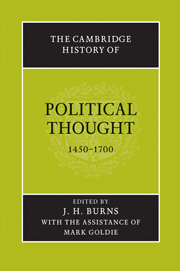Book contents
- Frontmatter
- Introduction
- I Renaissance and Counter-Renaissance
- 1 Humanism and political theory
- 2 Italian political thought, 1450–1530
- 3 Law
- 4 Transalpine humanism
- 5 Scholasticism: survival and revival
- II Religion, civil government, and the debate on constitutions
- III Absolutism and Revolution in the Seventeenth Century
- IV The end of Aristotelianism
- V Natural law and utility
- Conclusion
- Biographies
- Bibliography
- Index of names of persons
- Index of subjects
- References
4 - Transalpine humanism
from I - Renaissance and Counter-Renaissance
Published online by Cambridge University Press: 28 March 2008
- Frontmatter
- Introduction
- I Renaissance and Counter-Renaissance
- 1 Humanism and political theory
- 2 Italian political thought, 1450–1530
- 3 Law
- 4 Transalpine humanism
- 5 Scholasticism: survival and revival
- II Religion, civil government, and the debate on constitutions
- III Absolutism and Revolution in the Seventeenth Century
- IV The end of Aristotelianism
- V Natural law and utility
- Conclusion
- Biographies
- Bibliography
- Index of names of persons
- Index of subjects
- References
Summary
Renaissance eloquence: rhetoric and philosophy
Skirting the problematical subject of the reception of Renaissance humanism outside Italy (Skinner 1978, 1, ch. 7) this chapter addresses itself directly to humanism as an established phenomenon north of the Alps. Chronologically it spans what may be described as northern humanism's epic phase: the period from roughly the last decade of the fifteenth century when, with the writing of such scholars as Robert Gaguin in France, Conrad Celtis in Germany, and John Colet in England, humanist discourse in the north acquired a native voice, down to the late 1530s when, with the death of the generation of Erasmus and Budé, and the burgeoning of the Reformation and the Counter-Reformation, northern humanism lost its discrete character as a cultural force – succumbing to the role of handmaiden in the service of a variety of other cultural forces. The specific concern of the chapter is to explore the intellectual and ideological content of the political literature generated by northern humanism in this epic phase. Thus, having skirted a historigraphical Scylla, it will be necessary to engage with a Charybdis.
Charybdis looms in the form of a well-established orthodoxy which denies Renaissance humanism any specific philosophical content. It does so by defining humanism in exclusively literary and educational terms, as a movement devoted to the cultivation of bonae literae and the studia humanitatis. Accordingly, it is argued, the involvement of humanists with the larger questions of religion, morality, and politics must be distinguished from their proper role as humanists.
- Type
- Chapter
- Information
- The Cambridge History of Political Thought 1450–1700 , pp. 95 - 131Publisher: Cambridge University PressPrint publication year: 1991
References
- 5
- Cited by

